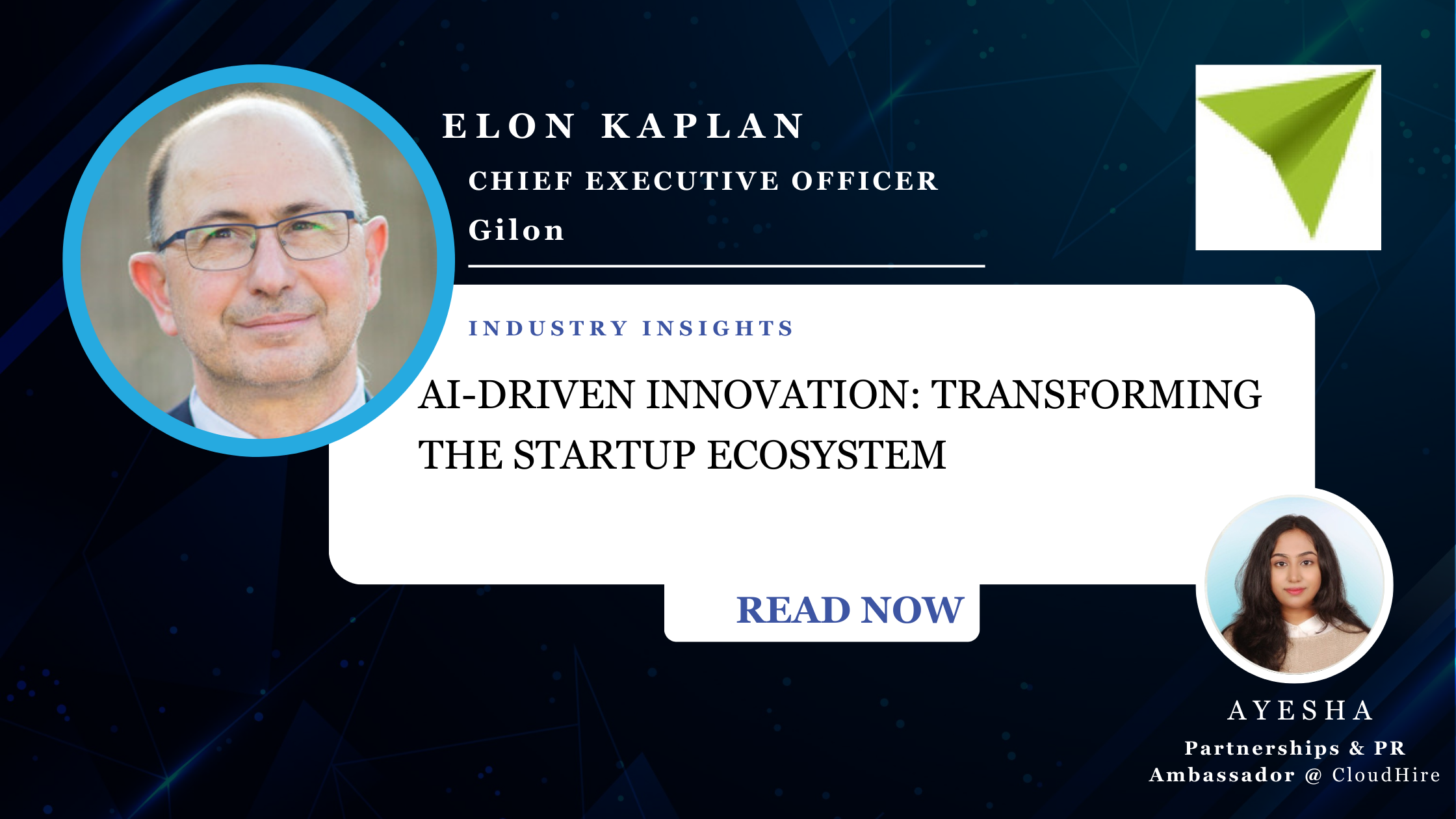In today’s rapidly evolving business landscape, the intersection of artificial intelligence (AI) and entrepreneurship is creating unprecedented opportunities for innovation. At the forefront of this transformation is Gilon, a pioneering platform that’s reshaping how startups, investors, and mentors interact within the innovation ecosystem. Led by CEO Elon Kaplan, Gilon is leveraging AI to address critical challenges in the startup world and accelerate the pace of innovation.
The Innovation Ecosystem Challenge
The traditional startup ecosystem faces several hurdles that impede rapid innovation and growth:
- Inefficient matchmaking between startups and investors
- Lack of liquidity for early-stage investments
- Limited risk hedging opportunities for investors
- Difficulty in accurately assessing startup potential
These challenges often result in missed opportunities, slower growth, and increased risk for all parties involved. Elon Kaplan and his team at Gilon have recognized these pain points and developed an AI-driven solution to address them head-on.
AI-Powered Solutions for a Dynamic Ecosystem
Gilon’s approach to solving these challenges is multifaceted, leveraging cutting-edge AI technologies to create a more efficient and effective startup ecosystem:
1. Intelligent Matchmaking
One of the core features of Gilon’s platform is its ability to facilitate intelligent matchmaking between startups and investors. By utilizing a network of specialized, small-scale language models (LLMs), Gilon can analyze vast amounts of data to identify the most promising connections.
Kaplan emphasizes the importance of going beyond surface-level matches. The system aims to “kiss fewer frogs and more princesses” by delving deeper into the profiles and needs of both startups and investors. This approach ensures that connections are not just based on superficial criteria but on a comprehensive understanding of each party’s goals, strengths, and potential synergies.
2. Enhanced Liquidity for Early-Stage Investments
Recognizing the often illiquid nature of early-stage investments, Gilon has developed mechanisms to increase liquidity for investors. This feature addresses a significant pain point in the startup investment landscape, allowing investors to trade assets built in early-stage startups more easily.
By providing this liquidity, Gilon encourages more investment in early-stage companies, as investors have greater flexibility in managing their portfolios. This increased liquidity can lead to a more dynamic and responsive investment ecosystem, benefiting both startups and investors.
3. Risk Hedging Opportunities
Gilon’s platform also offers innovative risk-hedging opportunities for investors. By leveraging AI-driven analytics, the system can help investors balance their exposure across different investments and sectors. This feature is particularly valuable in the high-risk world of startup investing, where diversification and risk management are crucial.
Kaplan notes that this approach to risk management requires a different view altogether, providing each player visibility into their risk exposure and offering ways to leverage and hedge it through various partnerships.
4. Data-Driven Startup Assessment
One of the most powerful features of Gilon’s platform is its ability to generate comprehensive analytics on the business trajectory and potential of each startup automatically. This data-driven approach provides both startups and investors with a shared, objective view of a company’s prospects.
By utilizing AI to analyze various data points and metrics, Gilon offers a more nuanced and accurate assessment of a startup’s potential than traditional methods. This feature enables more informed decision-making for all parties involved in the startup ecosystem.
The Power of Micro-Segmentation
A key insight driving Gilon’s approach is the power of micro-segmentation in data analysis. Kaplan emphasizes that by breaking down large chunks of data into smaller, more specific segments, we can uncover valuable insights that might otherwise be overlooked.
This principle applies not only to Gilon’s startup assessment algorithms but also to various other industries. For example, in the financial sector, micro-segmentation can reveal low-risk opportunities within traditionally high-risk areas, leading to more equitable and efficient resource allocation.
Overcoming Implementation Challenges
While the potential of AI-driven platforms like Gilon is immense, implementing such systems comes with its own set of challenges:
1. Data Quality and Curation
One of the primary challenges in building AI-driven systems is ensuring the quality and relevance of the data used to train the models. Kaplan acknowledges that while data is now a commodity, insights derived from that data are gold.
To address this, Gilon employs AI throughout the data curation process, using advanced algorithms to analyze and refine raw data into usable, high-quality information. This approach allows the platform to handle vast amounts of data efficiently while maintaining the integrity of the insights generated.
2. AI Bias and Explainability
As with any AI system, addressing potential biases and ensuring the explainability of decisions is crucial. Gilon tackles this challenge by focusing on identity and factual information rather than subjective assessments. Additionally, the platform emphasizes the importance of understanding why AI makes certain decisions, rather than simply accepting outputs at face value.
3. DevOps and Hosting Costs
Kaplan identifies the world of DevOps and the cost of hosting as significant challenges for innovative AI startups. He criticizes the current landscape where major cloud providers create barriers to migration between clouds and impose high costs on startups.
To address this, Gilon advocates for more open and accessible AI infrastructure, similar to the approach taken by Meta with their Llama model. This would lower the barrier to entry for startups and accelerate innovation in the AI space.
Building High-Performing Teams in the AI Era
In addition to technological innovations, Kaplan emphasizes the importance of building high-performing teams to drive AI-powered startups forward. He shares his “MIDAS” approach to team building:
- Mission: Create a shared vision that challenges and inspires team members.
- Demand: Set concrete, achievable, but ambitious tasks that team members take ownership of.
- Support: Provide unwavering support to help team members succeed.
This approach, combined with lean startup principles and a focus on attracting top talent, enables Gilon to maintain a small but highly effective team that can leverage AI technologies to their fullest potential.
The Future of AI-Driven Innovation
As AI continues to evolve and permeate various industries, platforms like Gilon are poised to play an increasingly important role in shaping the future of innovation. By breaking down traditional barriers between startups, investors, and mentors, these AI-driven ecosystems can accelerate the pace of innovation and help bring groundbreaking ideas to market faster than ever before.
The insights provided by Elon Kaplan and the innovations developed by Gilon offer a glimpse into a future where AI not only powers new technologies but also fundamentally transforms how we approach innovation and entrepreneurship.
Conclusion
The AI-driven transformation of the startup ecosystem represents a significant leap forward in how we nurture and grow innovative ideas. Platforms like Gilon, with their focus on intelligent matchmaking, enhanced liquidity, and data-driven insights, are paving the way for a more efficient and effective innovation landscape.
As we move further into this AI-powered future, it’s clear that the most successful organizations will be those that can effectively leverage these technologies while building strong, mission-driven teams. By embracing these principles, startups and investors alike can position themselves at the forefront of innovation, driving progress and creating value in an increasingly competitive global marketplace.








